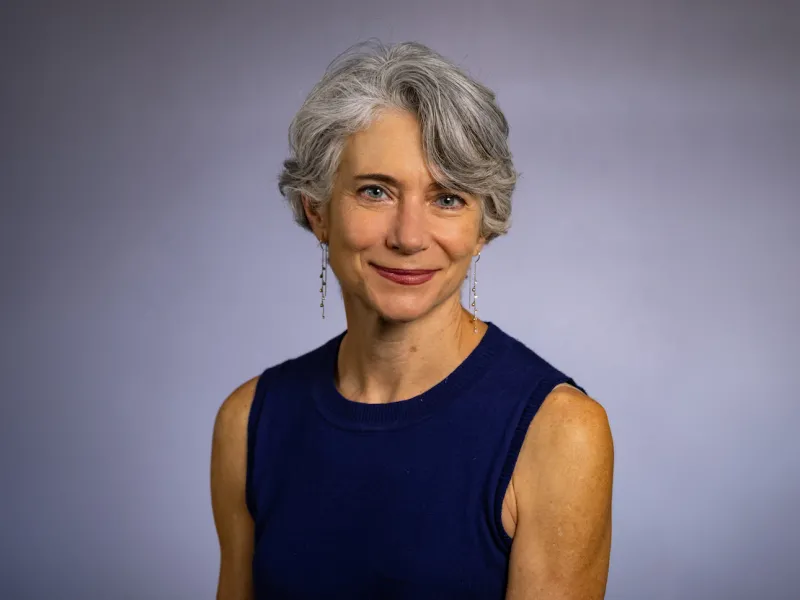
Education
Biography
Barbara E. Mundy is an art historian, best known for her work on the history of cartography, urban history and the history of the book. Her work focuses primarily on Mexico and New Spain, and the interactions between Indigenous peoples, settler colonists and their environments across the colonial period, roughly 1520-1800. With her first book, The Mapping of New Spain: The Maps of the Relaciones Geograficas, she brought to light the largely overlooked colonial mapping traditions of the native peoples of Mexico. Her recent prizewinning book, The Death of Aztec Tenochtitlan, the Life of Mexico City, chronicles the great urban metropolis of Mexico City, to reveal the Indigenous foundation that lies beneath one of the largest cities in the world, past and present.
Mundy's intellectual interests are wide-ranging: she has written about urban smellscapes and their relation to ecological changes brought by colonialism ("No place like home"); Nahua epistemologies of art production ("Indigenous image theory"); the impact of Aztec (Mexica) festival culture on Renaissance European urban design ("Mexica space and Habsburg time"). In a pair of articles co-written with Aaron Hyman (Johns Hopkins), she has turned a critical eye toward the development of colonial Latin American art history ("Out of the Shadow of Vasari" and "The Colonial Archive and its Fictions"). She has engaged with questions of race in Latin American painting ("Settler Colonialism, Families, and Racialized Thinking") and practices of decolonization (“Beyond Recognition?"), both co-written with her frequent collaborator Dana Leibsohn (Smith College). Concurrently, she has continued to contribute to scholarship on cartography.
Mundy's current book project, "The Embodiment of the Word: European Book Culture and New World Manuscripts" (working title) is an intervention into the history of the modern book, which has long sidelined the creations of Indigenous peoples. This project situates native bookmakers of the sixteenth century as they engaged with the new technologies of alphabetic writing and the printing press. It also considers the entangled networks of human actors and material agents that led to the creation of books. Versions of this project have been published: in "The emergence of alphabetic writing," Mundy examines the relations between painters and notaries. In the forthcoming, "Rock, Paper, Scissors," she looks at the important material of native paper.
Mundy's work extends to the digital humanities. With Dana Leibsohn, Mundy is the co-creator of Vistas: Visual Culture in Spanish America, 1520-1820. Digital projects are a fundamental part of her teaching practice. She is a longtime student of the Nahuatl language, the Indigenous language of Central Mexico, still spoken today. Her teachers have included R. Joe Campbell, Frances Karttunen, Alberto Zepeda, John Sullivan, and Eduardo de la Cruz Cruz.
Mundy served as the 2021-22 Kislak Chair at the Library of Congress; she has had fellowships at the Center for Advanced Study in the Visual Arts at the National Gallery of Art and at the John Carter Brown Library. She serves on the editorial board of The Americas, is a board member of the Association of Nahuatl Scholars, and is the past president of the American Society for Ethnohistory. Prior to coming to Tulane, she was a Professor of Art History at Fordham University in New York.
Selected Publications
The Death of Aztec Tenochtitlan, the Life of Mexico City. Austin: University of Texas Press, 2015. Spanish edition: La muerte de Tenochtitlan, la vida de México. Mexico City: Grano de Sal, 2018.
Painting a Map of Sixteenth-Century Mexico City: Land, Writing and Native Rule. Mary E. Miller and Barbara E. Mundy, eds. New Haven: Beinecke Library, distributed by Yale University Press, 2012.
The Mapping of New Spain: Indigenous Cartography and the Maps of the Relaciones Geográficas. Chicago and London: University of Chicago Press, 1996. Paperback edition, 2000.
“Rock, Paper, Scissors: Ethnohistory and an Indigenous Archive.” Forthcoming, Ethnohistory.
"The Colonial Archive and its Fictions," with Aaron M. Hyman. Colonial Latin American Review 32, 3 (2023), pp. 312-344.
“Indigenous Image Theory.” Word & Image 39, 2 (2023), pp. 260-282.
“Mexica space and Habsburg time.” Renaissance Quarterly 76, 2 (Summer 2023), pp. 365-407.
"Settler Colonialism, Families, and Racialized Thinking: Casta Painting in Latin America," with Dana Leibsohn. In Teaching Race in the European Renaissance: A Classroom Guide, Anna Wainwright and Matt Chapman, eds. 397-423. Tempe: Arizona Center for Medieval and Renaissance Studies Press, 2023.
“Beyond Recognition? Orphan Objects, Decolonization, and Religious Histories of the Spanish Americas” with Dana Leibsohn. In Digital Humanities and Material Religion: An Introduction, Rachel McBride Lindsey and Emily Suzanne Clark, eds. De Gruyter Press, 2022.
“Dating the Mapa Uppsala of Mexico-Tenochtitlan,” with Jennifer Saracino. Imago Mundi 73, part 1 (2021), pp. 2-15.
“No longer home: the smellscape of Mexico City, 1500-1600.” Ethnohistory 68, no. 1 (January 2021), pp. 77-101.
“The Plans of Mexico City, 1520-1810.” In A Companion to Viceregal Mexico City, 1519-1821, John López, ed. 303-327. Leiden: Brill, 2021.
"History in Maps from the Aztec Empire." In Time in Maps: From the Age of Discovery to Our Digital Era, Kären Wigen and Caroline Winterer, eds. 79-102. Chicago: University of Chicago Press, 2020.
“The emergence of alphabetic writing: tlahcuiloh and escribano in sixteenth-century Mexico.” The Americas: A Quarterly Review of Latin American History 77, 3 (July 2020), pp. 361-407.
"Out of the Shadow of Vasari: Towards a New Model of the 'Artist' in Colonial Latin America." With Aaron Hyman. Colonial Latin American Review 24, no. 3 (Winter 2016), pp. 283-317.
Courses
- Introduction to Art History: Global
- Material and Meaning in the Ancient Americas
- Aztec Art and Architecture
- Culture Clash in the Americas
- The Book in the Sixteenth-Century Americas
- Inventing a New World

